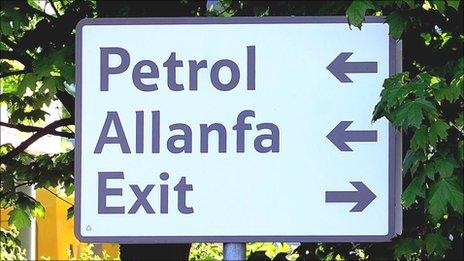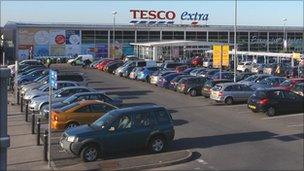Swansea Tesco Welsh-English signs to different exits
- Published

The Tesco sign tells drivers to exit left in Welsh (allanfa) and right in English
Ever felt so confused when shopping that you don't know which way to turn?
Spare a thought for visitors to one Swansea Tesco, where signs tell them to exit left in the Welsh language - allanfa - and on the right in English.
But the store said that while there is a contradiction between the signs, both directions are in fact exits, although one of them is via the petrol station.
"We'd like to reassure all customers that they are welcome to exit the car park in either direction," said Tesco.
The supermarket giant said it had consulted widely on all their bilingual signage.
It insisted that the confusion was an issue of positioning and layout, rather than one of translation or grammar.
The Welsh Language Board, charged with advising on and promoting the use of Welsh in businesses and public bodies, says in its guidelines: "Where there is a relationship between a number of signs - for example at the same location - they should all use the same method of distinguishing between Welsh and English."
Out of office
It is not the first time that road signs have left Welsh-speaking Swansea shoppers scratching their heads.
In 2008 officials from the city's council e-mailed colleagues, external to get a translation of a road sign at Morriston, which read in English: "No entry for heavy goods vehicles. Residential site only".
They then received an automated reply, which they assumed was the translation into Welsh, and put it on the sign.

Tesco says the sign confusion relates to positioning and layout, not translation
But it actually said in Welsh: "I am not in the office at the moment. Send any work to be translated."
While the Tesco sign has raised a few chuckles among Swansea shoppers, Meinir Jones of the Welsh Language Board said there was a more serious issue.
"Our advice for businesses and public bodies is to treat the two languages at the same level from the beginning and to plan how both languages will be used at the same time. It is vital that the Welsh text is given the same attention as the English text when it is edited and proofread.
"There is a huge surge in the use of Welsh by businesses and most companies are by now adopting the language to some degree or other. Most are aware that they need to use an accredited translator for the big jobs - refurbishment, entire store signage, automated Welsh answerphone systems and so on -but what to do if they have a niggling twenty something words to translate in a hurry?"
'Inflamed bladder'
She went on to explain that the WLB would, via their website, provide translations of up to 75 words, free of charge to businesses who wish to promote their use of the language and attract Welsh-speaking customers.
Other notable English/Welsh translation howlers in recent years include:
• Cyclists between Cardiff and Penarth in 2006 were left confused by a bilingual road sign telling them they had problems with an "inflamed bladder".
• In the same year, a sign for pedestrians in Cardiff reading 'Look Right' in English read 'Look Left' in Welsh.
• In 2006, a shared-faith school in Wrexham removed a sign which translated the Welsh for staff as "wooden stave".
• Football fans at a FA Cup tie between Oldham and Chasetown - two English teams - in 2005 were left scratching their heads after a Welsh-language hoarding was put up along the pitch. It should have gone to a match in Merthyr Tydfil.
• People living near an Aberdeenshire building site in 2006 were mystified when a sign apologising for the inconvenience was written in Welsh as well as English.
- Published14 December 2010